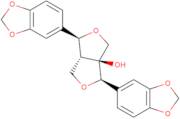Paulownin
CAS: 13040-46-5
Ref. 3D-NAA04046
| 1mg | Ausgelaufen | ||
| 5mg | Ausgelaufen | ||
| 10mg | Ausgelaufen | ||
| 25mg | Ausgelaufen | ||
| 50mg | Ausgelaufen |
Produktinformation
- (1S,3aS,4R,6aR)-1,4-bis(1,3-benzodioxol-5-yl)dihydro-1H,3H-furo[3,4-c]furan-3a(4H)-ol
- 1H,3H-Furo(3,4-c)furan-3a(4H)-ol, 1,4-bis(1,3-benzodioxol-5-yl)dihydro-, (1alpha,3aalpha,4alpha,6aalpha)-
- 1H,3H-Furo[3,4-c]furan-3a(4H)-ol, 1,4-bis(1,3-benzodioxol-5-yl)dihydro-, (1S,3aS,4R,6aR)-
- 1H,3H-Furo[3,4-c]furan-3a(4H)-ol, 1,4-bis(1,3-benzodioxol-5-yl)dihydro-, [1S-(1α,3aα,4α,6aα)]-
- 1H,3H-Furo[3,4-c]furan-3aα(4H)-ol, 6,6aα-dihydro-1α,4α-bis[3,4-(methylenedioxy)phenyl]-
- Paulownine
Paulownia is a genus of flowering plants in the family Paulowniaceae. Paulownia is a type of tree with a high content of natural compounds, such as fatty acids. The leaves are used in traditional Chinese medicine to treat inflammatory diseases. Paulownin (PAW) is a novel synthetic antioxidant that has been shown to have anti-inflammatory properties and inhibit cancer cell growth. PAW can be found in the leaves and seeds of the paulownia tree and has been shown to have pharmacokinetic properties that would make it suitable for oral administration. PAW inhibits inflammation by suppressing the production of pro-inflammatory cytokines IL-1β and IL-6, while also increasing the production of anti-inflammatory cytokine IL-10. PAW has not been tested on humans yet, but tests on mice show that it decreases tumor volume by inhibiting cancer cell proliferation.





